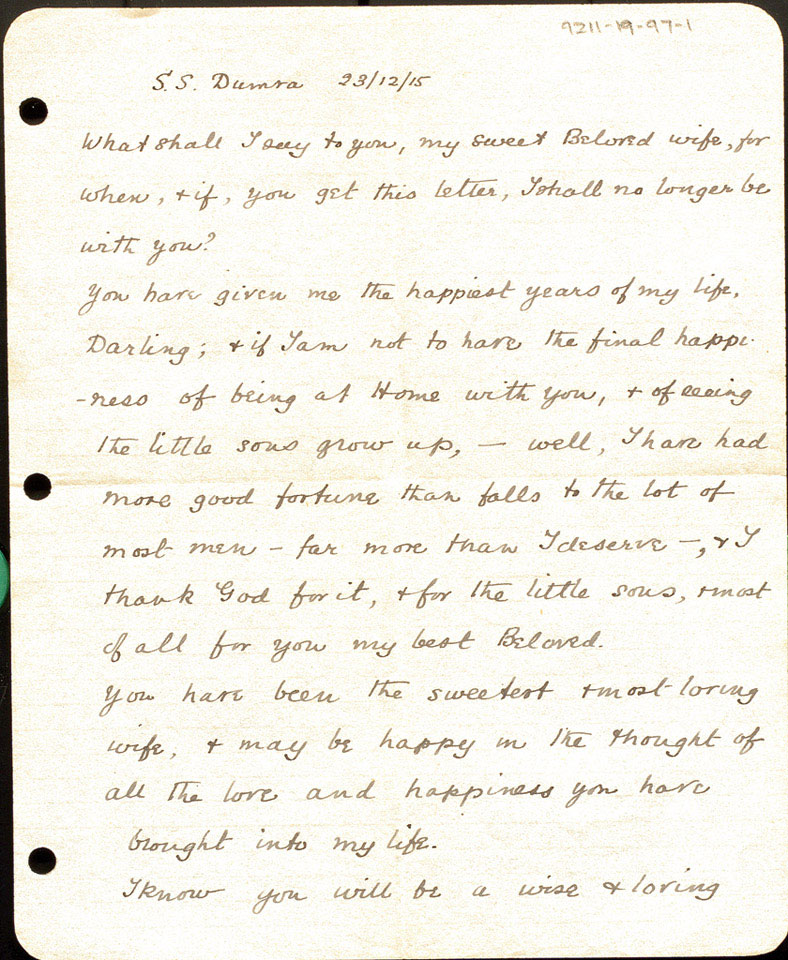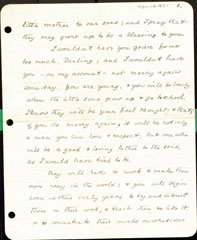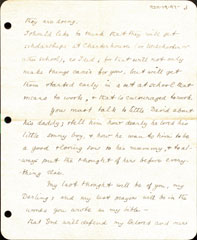
Online Collection
« Prev - 1 of 1 results - Next »
Letter from Major General Sir Arthur Money to his wife, to be delivered in event of his death, 23 December 1915
Arthur Wigram Money was born in 1866, and joined the Royal Artillery in 1885 at the age of nineteen. He had a varied and successful army career, serving mostly in India, but also in the East Indies, acting as the Persian interpreter to the Commander-in-Chief in 1898 to 1900, and in South Africa during the Boer War where he acted as Assistant Adjutant General for Transport from 1900 to 1902. In March 1911, at the age of forty-five, Money married twenty-nine year old Euphemia Mabel Drummond in London. The couple had two children, David and George. During the First World War, Money, a devoted husband, wrote to his wife every week, adding an instalment to each letter almost every day. His letters are extremely affectionate, telling her about his daily life and eager for details of her and the boys' activities.
The most touching letter that he wrote to her dates from December 1915. It was written at sea as Money sailed to Mesopotamia to take up a new command. Anxious and apprehensive about the future, this letter was only to be opened on the event of his death in service. Loving, affectionate and generous as ever, he urged her in the letter not to grieve over him too much, reassured her that she would be a wonderful mother to their boys, and encouraged her to re-marry.
'What shall I say to you, my sweet Beloved wife, for when, & if, you get this letter, I shall no longer be with you?You have given me the happiest years of my life, Darling; & if I am not to have the final happiness of being at Home with you, & of seeing the little sons grow up, - well, I have had more good fortune than falls to the lot of most men - far more than I deserve-, & I thank God for it, & for the little sons & most of all for you my best beloved.You have been the sweetest & most loving wife, & may be happy in the thought of all the love and happiness you have brought into my life. I know you will be a wise & loving little mother to our sons; and I pray that they may grow up to be a blessing to you. I wouldn't have you grieve for me too much, Darling; and I wouldn't have you - on my account - not marry again someday. You are young, & you will be lonely when the little sons grow up & go to school. I know they will be your first thought; & that, if you do marry again, it will be not only a man you can love & respect, but one who will be a good & loving father to the sons, as I would have tried to be.They will have to work & make their own way in the world; & you will begin even in their early years to try and interest them in their work, & teach them to like it, & to concentrate their minds on whatever they are doing.I should like to think that they will get scholarships at Charterhouse (or Winchester or other school), as I did, for that will not only make things easier for you, but will get them started early in a set at school that means to work, & that is encouraged to work.You must talk to little David about his daddy; & tell him how dearly he loved his little sonny boy, & how he wants him to be a good & loving son to his mummy, & to always put the thought of her before everything else. My last thought will be of you, my Darling; and my last prayer will be in the works you wrote in my bible - that God will defend my Beloved and our little sons, keep them in body & soul, & grant that they & I may be bound together by the unseen chain of this love, by the communion of His Spirit, and by the Holy fellowship of His Saints; and that we may finally be together in his heavenly Kingdon.
God bless & keep you, my sweet and Beloved wife.'
NAM Accession Number
NAM. 1992-11-19-97
Copyright/Ownership
Copyright: The Family of Sir Arthur Money
Location
National Army Museum, Study Collection
Object URL
https://collection.nam.ac.uk/detail.php?acc=1992-11-19-97



